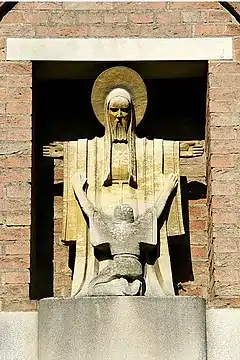John 20:28
John 20:28 is the twenty-eighth verse of the twentieth chapter of the Gospel of John in the New Testament. It is part of a description of what the book says is Jesus' reappearance to the disciples, including Thomas, eight days after his resurrection.
| John 20:28 | |
|---|---|
← 20:27 20:29 → | |
 Portland Stone carving showing St.Thomas kneeling to the risen Christ, by Philip Pape in 1956. St.Thomas' church. | |
| Book | Gospel of John |
| Christian Bible part | New Testament |
Content
The original Koine Greek, according to the Textus Receptus, reads:[1]
- καὶ ἀπεκρίθη ὁ Θωμᾶς, καὶ εἶπεν αὐτῷ, Ὁ Κύριός μου καὶ ὁ Θεός μου
In the King James Version of the Bible it is translated as:
- And Thomas answered and said unto him, My Lord and my God.
The modern World English Bible translates the passage as:
- Thomas answered him, "My Lord and my God!"
For a collection of other versions see BibleHub John 20:28
Analysis
In John 13:13–14 Jesus used the term 'teacher' and 'lord' as synonyms, but here 'my Lord' is designated to the risen Christ, and 'my God' resumes Jesus' description in the Prologue as 'God' (John 1:1, 18).[2] This is the only time in the four canonical gospels that Jesus is addressed as God.[3]
Suetonius records that the Roman emperor Domitian (AD 81-96) wished to be addressed as dominus et deus noster, "our Lord and God",[4] so the statement in this verse 'may on a secondary level be designed to counter Roman emperor worship'. [5]
It is well known that the declension of the Greek words lord (Κύριός) and God (Θεός) is in both cases the nominative declension. Greek, like Latin, has a vocative declension when addressing somebody. The vocative for the word lord (Κύριε) is used 120 times in the New Testament.[6] The words 'lord' and 'God' used in this verse are both in the nominative declension - the declension used for the subject of a sentence or when just referring to somebody or something. Therefore, a case can be made on linguistic grounds that Thomas was not addressing Jesus here but that the verse represents an emotional exclamation.
References
- Greek Text Analysis: John 20:28. Biblehub
- Kieffer 2007, p. 998.
- Bruner, Frederick Dale (2012). The Gospel of John: A Commentary. Wm. B. Eerdmans Publishing. p. 1187. ISBN 9780802866356.
- Suetonius, Domitian 13.2; apud Köstenberger 2004, p. 580.
- Köstenberger, Andreas J. (2004). John. Baker Exegetical Commentary on the New Testament. Volume 4 (illustrated ed.). Baker Academic. p. 580. ISBN 9780801026447.
- Greek word: 2962 kurie. Biblehub
Sources
- Guthrie, Donald (1994). "John". In Carson, D. A.; France, R. T.; Motyer, J. A.; Wenham, G. J. (eds.). New Bible Commentary: 21st Century Edition (4, illustrated, reprint, revised ed.). Inter-Varsity Press. pp. 1021–1065. ISBN 9780851106489.
- Kieffer, René (2007). "60. John". In Barton, John; Muddiman, John (eds.). The Oxford Bible Commentary (first (paperback) ed.). Oxford University Press. pp. 960–1000. ISBN 978-0199277186. Retrieved February 6, 2019.